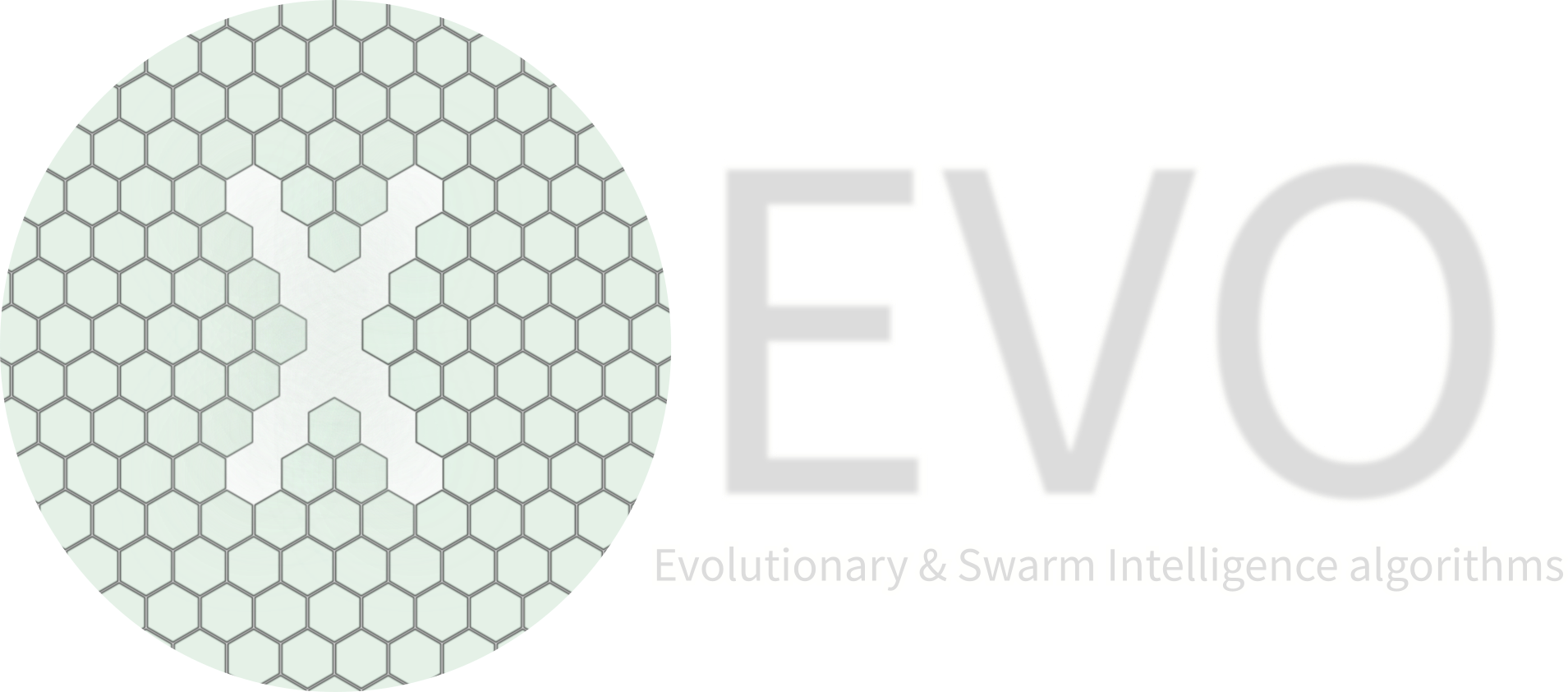This is the git repository for the c++ package xevo.
xevo depends on xtensor developed by QuantStack.
xevo is a C++ templated library for creating flexible evolutionary and swarm intelligence algorithms. The implemented algorithms are designed in a way so the user can control/define the algorithm's main functional elements (e.g. mutation, crossover, etc.).
The main body of ga algorithm is attached below
class ga
{
public:
template<class E, class POP = Population, typename... PopArgs,
typename T = typename std::decay_t<E>::value_type>
void initialise(xt::xexpression<E>& X, std::tuple<PopArgs...> popargs = std::make_tuple());
template<class E, class OBJ, class ELIT = Elitism, class SEL = Roulette_selection, class CROSS = Crossover,
class MUT = Mutation_polynomial, typename... ElitArgs, typename... SelArgs, typename... CrossArgs,
typename... MutArgs, typename T = typename std::decay_t<E>::value_type>
void evolve(xt::xexpression<E>& X, OBJ objective_f, std::tuple<ElitArgs...> elitargs,
std::tuple<SelArgs...> selargs, std::tuple<CrossArgs...> crossargs, std::tuple<MutArgs...> mutargs);
};- Initialise
<class E, class POP = Population>
xevo::ga::initialise<E, POP>(E& X, std::tuple<PopArgs>(...) popargs)This is a method to initialise the initial population stored in X array. The user can provide a Population functor so as to control how the initialisation will be calculated.
- evolve
template<class E, class OBJ, class ELIT = Elitism, class SEL = Roulette_selection, class CROSS = Crossover,
class MUT = Mutation_polynomial>
void evolve(E& X, OBJ objective_f, std::tuple<ElitArgs...> elitargs,
std::tuple<SelArgs...> selargs, std::tuple<CrossArgs...> crossargs, std::tuple<MutArgs...> mutargs)This method is for evolving the population X. The user can provide functors for objective function evaluation, elitism, selection, mutation and crossover calculations.
Optimise Rosenbrock function with xevo::ga.
Rosenbrock function is expressed as:
The first step is to provide the objective function as (we use scaling):
struct Rosenbrock_scaled
{
template <class E, typename T = typename std::decay_t<E>::value_type>
auto operator()(const xt::xexpression<E>& X)
{
double beta = 8.0;
auto y = evaluate(X);
auto max_index = xt::argmax(y)();
T y_max = y(max_index);
T factor = (-1)*(beta / y_max);
return xt::eval(xt::exp(factor * (y)));
}
private:
template <class E, typename value_type = typename std::decay_t<E>::value_type>
inline auto evaluate(const xt::xexpression<E>& X)
{
const E& _X = X.derived_cast();
auto shape = _X.shape();
std::size_t dim = _X.dimension();
if (dim != 2)
{
throw std::runtime_error("The input array should be of dim 2");
}
xt::xtensor<value_type, 1, xt::layout_type::row_major> _x1(xt::view(_X, xt::all(), 0));
xt::xtensor<value_type, 1, xt::layout_type::row_major> _x2(xt::view(_X, xt::all(), 1));
// scale in [-3, 3]
auto X1 = 6.0*_x1 - 3;
auto X2 = 6.0*_x2 - 3;
xt::xtensor<value_type, 1, xt::layout_type::row_major> y =
xt::eval(100.0*xt::pow(xt::pow(X1, 2) - X2, 2) + xt::pow(1 - X1, 2));
return y;
}
};Once the objective is defined, we can simply run the ga with the default functors as:
std::array<std::size_t, 2> shape = {40, 2};
xt::xarray<double> X = xt::zeros<double>(shape); //define the dimension of X (population size 40 and gene size 2.)
xevo::Rosenbrock_scaled objective_f; // define objective function
xevo::ga genetic_algorithm;
genetic_algorithm.initialise(X); // initialise population with the default population functor (random generation between 0-1)
std::size_t num_generations = 300;
for (auto i{0}; i<num_generations; ++i)
{
// evolve the population with default functors for elitism, selection, crossover and mutation.
genetic_algorithm.evolve(X, objective_f, std::make_tuple(0.05),
std::make_tuple(), std::make_tuple(0.8),
std::make_tuple(0.5, 60.0));
}To clone the repository type:
git clone https://github.com/giorgosR/xevo.gitYou can install xevo from conda or build the source with cmake.
- Anaconda
conda install xevo -c giorgosR- CMAKE
Just go to the git repository and type the following:
mkdir build && cd build
cmake -DCMAKE_INSTALL_PREFIX=<install_dir> -DCMAKE_INSTALL_LIBDIR=<lib_dir> ../
cmake --build ./ INSTALLThere is a docker image giorgosr/xevo that can be pulled and test xevo with xeus-cling jupyter kernel. If you have docker on your system type:
docker pull giorgosr/xevo:latestOnce pulled, run the image as
docker run -p 8080:8888 giorgosr/xevo:latestThis will start a jupyter kernel inside the docker image. To connect to the kernel, open your browser and paste the following address:
http://localhost:8080Then paste the token which can be found on the docker running image.
To build the documentation, the following packages are needed:
- doxygen
- sphinx
- sphinx_rtd_theme
- breathe
Create a conda environment from conda yml file as:
conda env create -n docs -f docs.yml
conda activate docsOnce the environment is created, inside build folder reconfigure as:
mkdir build && cd build
cmake -G Ninja -DBUILD_DOCUMENTATION=ON
-DDOXYGEN_EXECUTABLE=${CONDA_PREFIX}\Scripts\doxygen.exe"
-DSPHINX_EXECUTABLE=${CONDA_PREFIX}\Scripts\sphinx-build.exe" ../
ninja doc && ninja Sphinx
